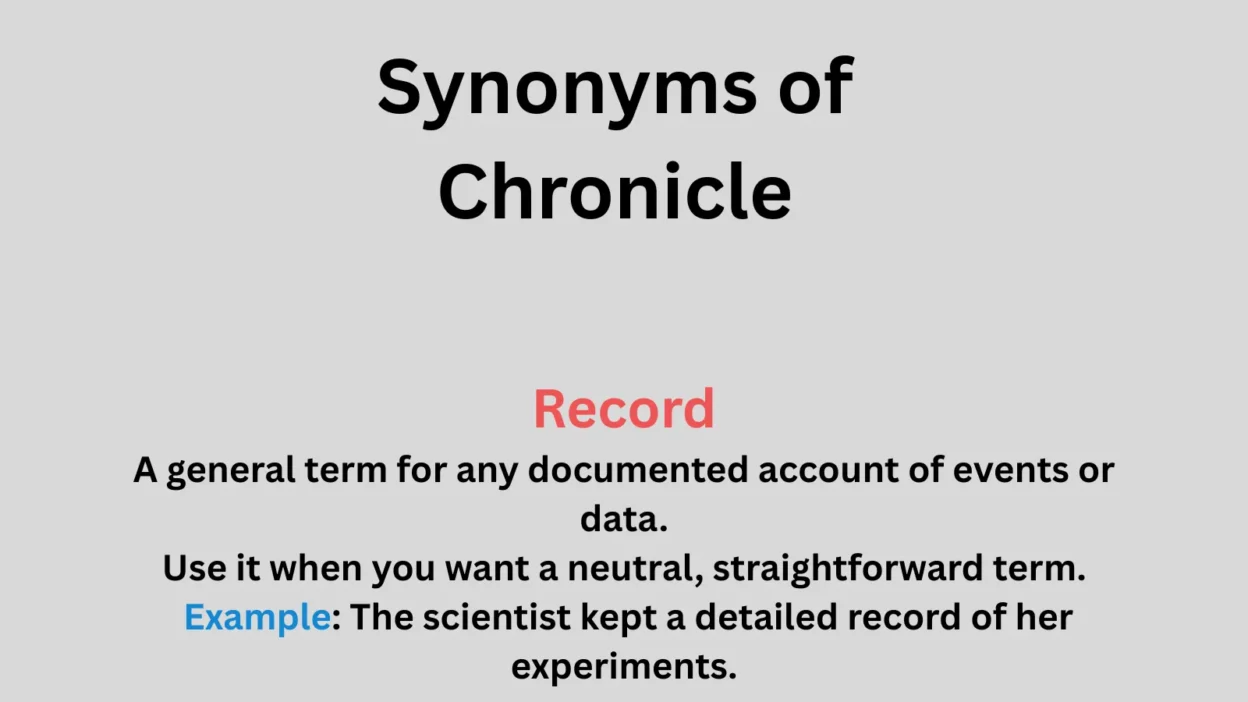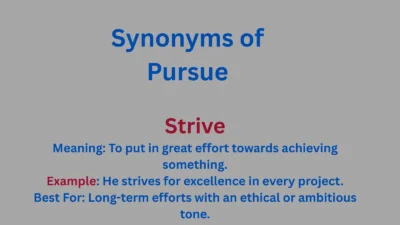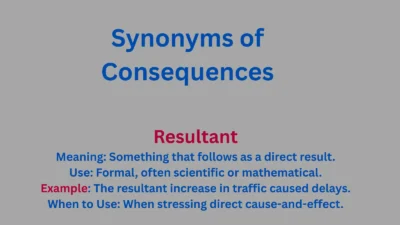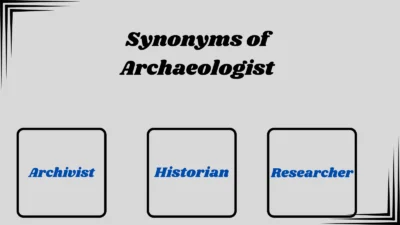Synonyms of chronicle offer a variety of ways to describe detailed, factual records of events. The word chronicle itself is fascinating—it generally refers to a careful narration arranged in chronological order, presenting facts plainly without added interpretation or emotional coloring.
Chronicles tend to be modest and reserved in tone, often used in historical writing, journalism, or any context where clarity and accuracy are key. But what if you want to switch things up? Maybe you need a synonym that suits a slightly different tone, context, or style.
If you’re writing a novel, a report, or a casual blog post, choosing the right synonym can sharpen your expression and fit your audience better.
What Does “Chronicle” Really Mean?
At its core, a chronicle is:
- A factual account or record of events in the order they happened
- Usually impartial and straightforward
- Often historical or journalistic
- Modest and reserved in tone, without exaggeration or emotional flair
This makes it great for clear storytelling or documentation, like a diary, a timeline, or news reporting.
Synonyms of Chronicle and When to Use Them
1. Record
A general term for any documented account of events or data.
Use it when you want a neutral, straightforward term.
Example: The scientist kept a detailed record of her experiments.
2. Account
A description or report of an event, sometimes including personal perspectives.
Good for telling stories with some interpretation.
Example: He gave an account of the accident from his viewpoint.
3. History
A broader term that can imply an extensive, researched narrative of past events.
Use when referring to long-term or significant events.
Example: The history of the ancient empire is fascinating.
4. Narrative
A story or description that can be factual or fictional, often with a structure.
Best for storytelling, with a bit of style or personal voice.
Example: Her narrative about the journey was gripping.
5. Diary
A personal daily record, often emotional or subjective.
Choose when emphasizing intimacy and private thoughts.
Example: She wrote in her diary every night.
6. Journal
A formal or informal personal record, often kept over time.
Suitable for both personal reflections and professional logs.
Example: The explorer’s journal detailed his adventures.
7. Log
A systematic and often technical record of events or actions.
Used mostly for practical or official purposes.
Example: The captain kept a log of the ship’s course.
8. Annals
Official historical records are arranged year by year.
Good for formal historical or institutional records.
Example: The annals of the kingdom were preserved in the royal library.
9. Chronology
A list or sequence of events in order.
Perfect when emphasizing the timeline.
Example: The chronology of the project’s milestones helped track progress.
10. Memoir
A personal account focusing on specific experiences.
Use for reflective, emotional storytelling.
Example: Her memoir detailed life during wartime.
11. Biography
A detailed account of someone’s life.
Appropriate for personal histories.
Example: The biography of the scientist inspired many students.
12. Story
A broad, often informal term for any recounting of events.
Good for casual or creative writing.
Example: He told a story about his childhood.
13. Report
An official or formal account of facts or findings.
Choose when emphasizing factual clarity and analysis.
Example: The police report described the incident in detail.
14. Memo
A short, informal record or communication.
Best for internal or brief notes.
Example: She sent a memo summarizing the meeting.
15. Tale
An imaginative or informal story, often with a moral or entertainment purpose.
Good for folklore or creative narratives.
Example: The old man told a tale about the haunted forest.
16. Chronogram
A historical inscription or record where dates are encoded in words.
Very niche, for specialized historical texts.
Example: The chronogram on the monument dates it to 1720.
17. Register
An official list or record, often for formal entries.
Used in legal or bureaucratic contexts.
Example: The birth register holds all official birth records.
18. Anniversary
Often used to mark or recount an important event’s date yearly.
Useful in commemorative writing.
Example: The company celebrated its 50th anniversary with a detailed chronicle.
Quotetypes.com is your new home for meaningful quotes that inspire your day, lift your mood, and touch your heart.
19. Logbook
A detailed record, especially of a ship, plane, or other technical activity.
Appropriate in transport or military contexts.
Example: The pilot updated the logbook after every flight.
20. Chronicle (as a verb)
To record events as they happen.
Use actively when narrating the act of recording.
Example: The journalist chronicled the unfolding events live.
21. Recital
An account or narration of events or facts.
Often formal or ceremonial.
Example: The recital of the treaty’s history was detailed.
22. Memoir
A personal narrative focusing on a slice of life or a theme.
Best for subjective, emotional, or reflective accounts.
Example: The memoir recounted her years in Paris.
23. Synopsis
A brief summary or overview of events or a text.
Useful for condensed, to-the-point writing.
Example: The synopsis of the novel was included on the book jacket.
24. Outline
A structured summary highlighting main points or events.
Good for planning or organizing information.
Example: The professor provided an outline of the lecture.
25. Epic
A grand, sweeping narrative often involving heroic deeds.
Choose for dramatic, large-scale storytelling.
Example: The epic chronicled the hero’s journey through the kingdom.
26. Saga
A long story of heroic achievement or family history.
Good for multigenerational or expansive tales.
Example: The family saga spans five generations.
27. Chronicle (as a noun)
Refers to the written record itself, often formal and historical.
Use when emphasizing the written document.
Example: The chronicle of the city dates back centuries.
28. Bulletin
A brief official statement or update on current events.
Best for timely, concise communication.
Example: The bulletin announced the emergency measures.
29. Case Study
An in-depth analysis or detailed record of a particular case or event.
Appropriate in academic or professional contexts.
Example: The case study chronicled the patient’s recovery.
30. Diary Entry
A specific record of a single day’s events or thoughts.
Great for personal, day-to-day accounts.
Example: Her diary entry from that day revealed her anxiety.
How to Choose the Right Synonym for “Chronicle”
1. Consider the tone:
- For neutral, factual accounts, stick with record, account, or report.
- For personal and emotional tones, pick diary, memoir, or journal.
- For grand or dramatic storytelling, use epic, saga, or tale.
2. Think about the context:
- In formal or historical writing, annals, chronology, or register fit best.
- For casual or creative writing, try a story, a tale, or a narrative.
- Technical or professional contexts call for a log, logbook, or case study.
3. Cultural and emotional nuances:
- Memoirs and diaries often carry emotional depth and subjectivity, suitable for introspective or reflective writing.
- Annals and chronicles suggest official or institutional records, more detached and authoritative.
- Some synonyms, like bulletin or memo, imply brevity and immediacy.
4. Audience matters:
- For academic or professional readers, case study, report, and register work well.
- For general readers or creative audiences, choose engaging terms like story, narrative, or tale.
Conclusion
Choosing the right synonym for chronicle depends on what you want to convey: the tone, formality, emotional depth, and context all play a role. Whether you need a modest, reserved record or a lively, emotional story, there’s a synonym here that will fit your writing like a glove.
Next time you write about events, think about whether you want to record facts, share a memoir with feeling, or tell an epic tale of adventure.
With these 30 alternatives at your fingertips, you can add variety and precision to your writing, making every chronicle uniquely yours.




